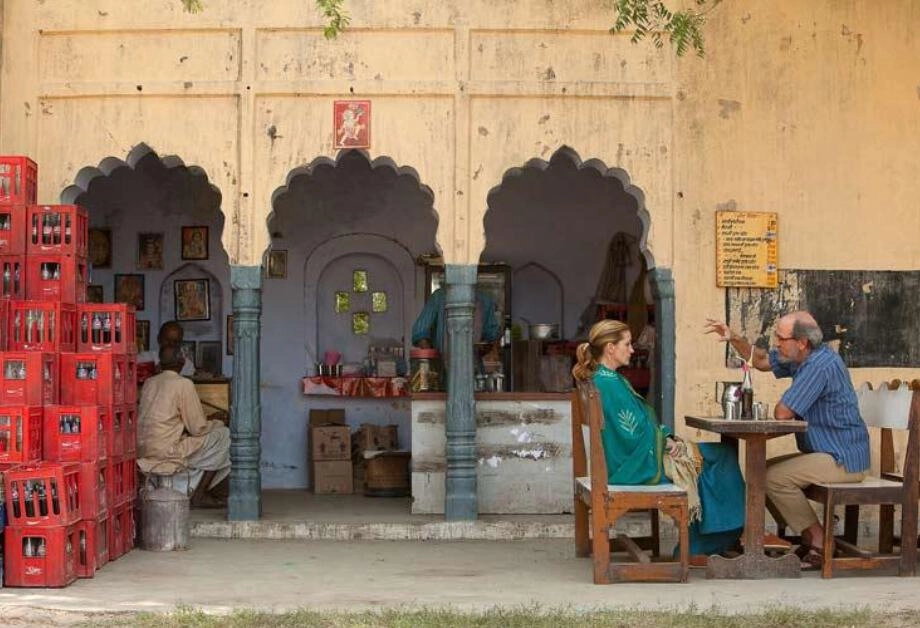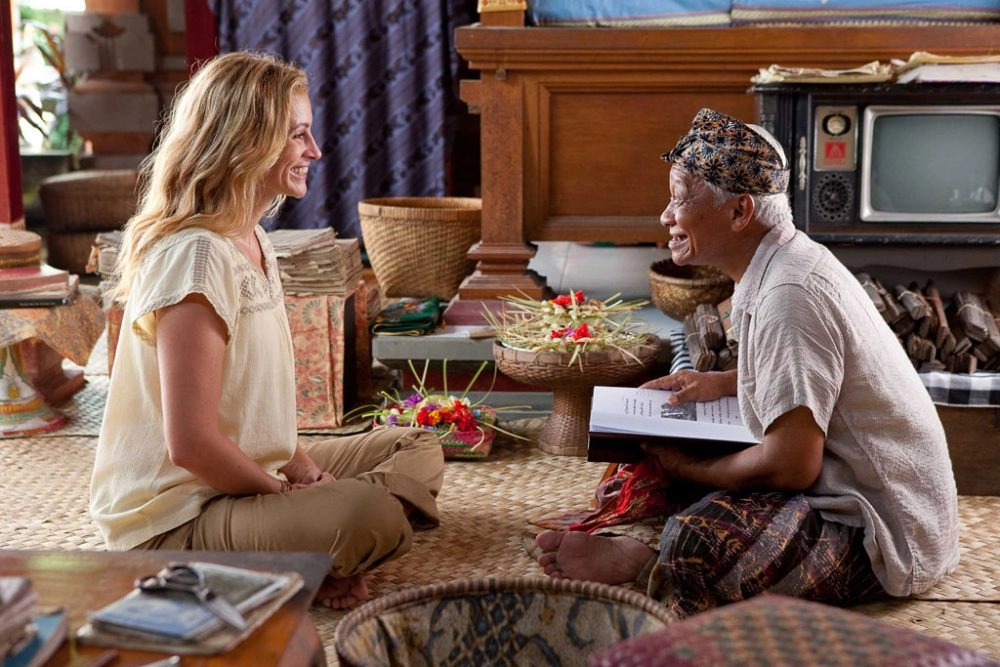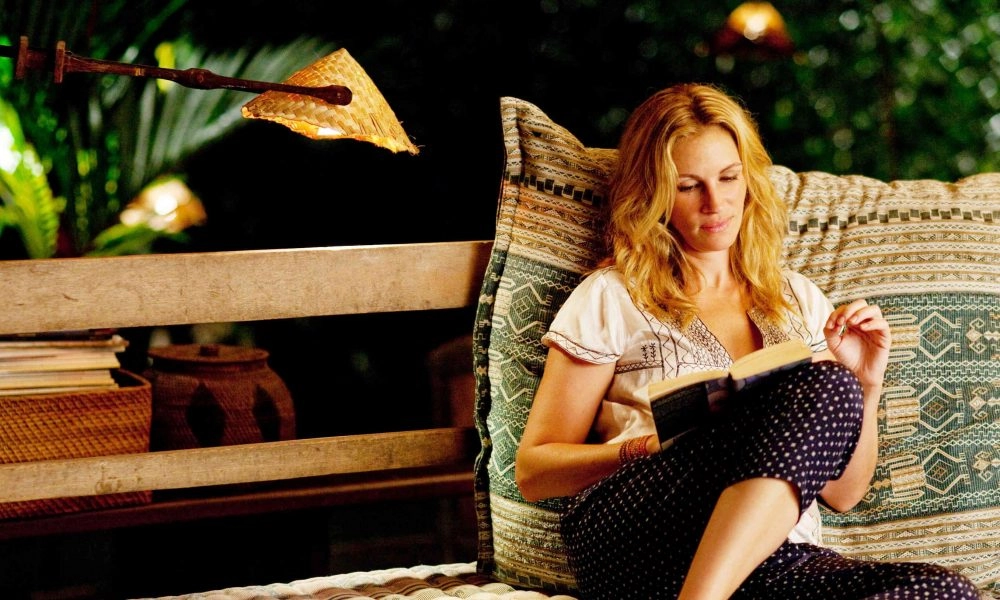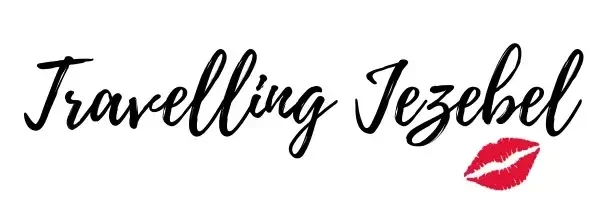Eat, Pray, Love and White Privilege – Unpacking Eat, Pray, Love, Criticism
I was pretty late to the game with Eat, Pray, Love. I saw the movie in 2015, on a flight back from my first trip to Asia. I’d spent 5 weeks backpacking around Thailand with some friends & while I won’t say that watching Julia Roberts flitting around the world was the sole reason I decided I had to go exploring again as soon as possible, it definitely didn’t hurt.
I was in Bali, solo, 3 months later, strolling among the same rice fields in Ubud that Roberts did in the Love section of her story and thinking how nice it would be if I too found love in Bali.
However, not everybody enjoyed Eat, Pray, Love as much as I did.
Since its release in 2006, Eat, Pray, Love has divided critics.
While some, of course, loved reading (or watching!) about Elizabeth Gilbert’s experiences in Italy, India and Indonesia, Gilbert has attracted more than her fair share of readers who begrudge her the fact that she is white and privileged and, God forbid, had money with which to travel.

Reviewer after reviewer have waxed lyrical about how Gilbert is nothing more than a spoiled American chick who had a nice long holiday & got a big fat pay check for it.
These people make no secret of their distaste for the fact that Gilbert had money, conveniently glossing over the fact that she actually used the advance for her book to pay for the trip rather than relying on mommy & daddy or a hefty divorce settlement.
These snarky (and dare I say, jealous) reviewers throw shade at Gilbert for having the audacity to spend her own money on a trip that was largely spent eating pasta & meditating. They resent that she had so much time to spend ‘navel-gazing,’ as though it is somehow unreasonable to come out of an unhappy marriage and want to spend some time alone with your thoughts.
Gilbert’s critics, it seems, refuse to believe that she is a relatable protagonist, mainly, it seems, because she actually went on the trip at all.
Nobody would have been mad if Gilbert had spent the money on a fancy Manhattan apartment, falafal & Jimmy Choos. Those are the things that rich white women are supposed to spend their money on.
However, the fact that Gilbert eschewed the white-picket fence lifestyle that she was headed towards in New York automatically seems to make her worthy of our judgement and criticism.
But should it?
Not many 34 year old women going through a divorce would be brave enough to pack their bags & travel solo to a different continent where they don’t know a soul.
It may sound patronising to bring Gilbert’s age into this – I don’t doubt that it would be left out entirely had she been a man – but I think that in a society that tells women that they are a failure if they are not married at 27 and pregnant by 30, it is especially difficult for a woman like Gilbert to just pack up and leave. The fact that many see Elizabeth as ‘selfish’ and ‘irresponsible’ for embarking on her trip says it all.
Again, would they be claiming this if Elizabeth were a man?

But the thing is, Elizabeth Gilbert isn’t this spoiled white woman that the critics want you to believe she is.
While many middle-class American women would describe their time at an ashram in India in that pretentious, faux-enlightened tone that we see all too often in books on mindfulness and wellbeing, Gilbert is brutally honest about her experience. She details her struggles to meditate, fears that she is ‘doing it wrong’ and the resentment she feels at having to wake up at 3am each morning to chant.
She is also totally unapologetic about the fact that her reason for visiting Italy is the pursuit of pure pleasure. It may seem insignificant to the casual reader, but as a successful career woman, it wouldn’t surprise me if Elizabeth Gilbert had never dedicated herself to pleasing herself rather than trying to please her boss, husband, friends or society.
Another thing that Gilbert doesn’t shy away from mentioning are her struggles with mental health whilst in Italy. She describes how her demons ‘Flank me – Depression on my left, Loneliness on my right. They don’t need to show me their badges. I know these guys very well,’ and details her worries about whether or not she made the right decision to leave her former life behind: navel-gazing maybe, but have we become that devoid of human compassion that we are unable to read a few paragraphs of somebody’s inner turmoil without rolling our eyes and condemning them?

Perhaps part of the reason that people love to hate Gilbert is that she is actually alright. She behaves nothing like the stereotypical American tourist. She actually learns Italian before arriving in Italy, and her trip to Bali sees her spending the vast majority of her time with a medicine man of indeterminable age and an endearing local woman rather than schmoozing with the wealthy expat crowd.
Gilbert details more information about Balinese culture in one page than I picked up in a whole month of being there, and when she does fall prey to cliché and meet a man, she acknowledges the ‘almost ludicrously fairy-tale ending to this story.’
This annoys people.
It annoys them because they want so much to dislike Gilbert, but she proves, time and time again, to be an extremely likeable protagonist, and her intelligent, self-deprecating prose only adds to that.

It is also undeniable that Eat, Pray, Love has inspired hundreds of thousands of women of all races, ages and background to bite the bullet and embrace solo female travel.
For many, Eat, Pray, Love was the final push that they needed to just get out there and do it. Elizabeth proved that she could traverse this world as a woman, even in countries where women are often scared to travel, and that not only was she capable, but she thrived.
Sure, if you want tales of somebody trekking through the wilderness, wrestling with bears and overcoming a multitude of life-threatening obstacles, then sure, Eat, Pray, Love will be a disappointment.
If you want a thought-provoking book about women’s rights then Eat, Pray, Love is not it.
However, if you want to know exactly what it feels like to stick a middle finger up to society’s expectations and go on not only a physical journey, but also a spiritual and emotional one, then this might just be the book (or film!) for you.
More Book Reviews
11 Books About Human Rights Every Feminist Should Read
The Girl Who Escaped ISIS Book Review
If you liked this article and would like to support my work, please click the button above to donate a couple of bucks and buy me a coffee. The ad revenue that I receive on this website is minimal, so support from my readers enables me to keep creating content that you (hopefully!) love to read.

I brought this book with me on my first (and solo) backpacking trip and had it highlighted and annotated by the time I was done. I spent many dear moments with that book, and was so shocked when I realized it received some widespread criticisms! Love your defense of Gilbert as a heroine, I totally agree.
Thank you! I loved it as well, and was also shocked!
I really scored today!!
A charity shop left a heap of books outside with a sign saying ‘Free’.
This book was among them.
I also got a few books of the ‘Brigid Jones’ book series for free there. I read the first one a number of years ago.
Oh wow! I’ve never found any good books in the free sections! Haha. Enjoy 🙂
I am adding that to my list of books to get now. I haven’t yet read it or seen the movie.
As for the critics, everybody who is doing anything has critics.
They are the cloud behind the silver lining.
I used to write stuff and put it online. I removed it because the critics were so many and so bad that I actually became sick from the stress of it. Just imagine tens of thousands of critics describing in detail how they are going to kill or rape you and trawling the internet to find information about where you are and what you look like. I am still trying to figue out if there is a technique for not letting these people have such an affect.
Things critics say don’t deserve a response but I will give my opinion about things like white priviledge because I see it as more chatting with the more reasonable and nicer people of the internet rather than a response to the critics.
Almost everybody in the world is unpriviledged in some aspect. Wealthy, powerful white males are in the vast minority.
In my opinion, everybody should use what priviledge they have. Dumping guilt on people for being white or male or rich doesn’t take away lack of priviledge that others experience. What might reduce it is being an example of what is possible for women. We very much lack role models of how to use freedom in our history so we have a lot to overcome even after gaining some priviledge. The author of this book is one of those who can be a role model to help us deal with the fear, guilt, anger, regret, envy, confusion, embarassment and whatever other things women who are using the new found freedom that women have in some parts of the world might experience. Sometimes we just need to give ourselves permission to not let what we feel limit us and a role model shows us that being female is not enough to stop us anymore because giving herself permission is what this author did.